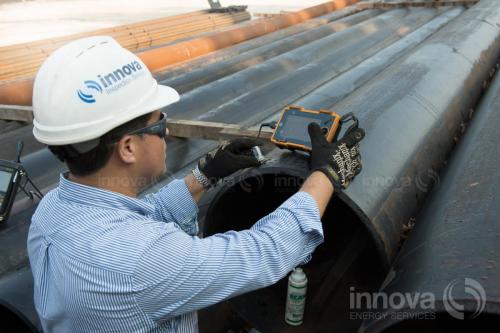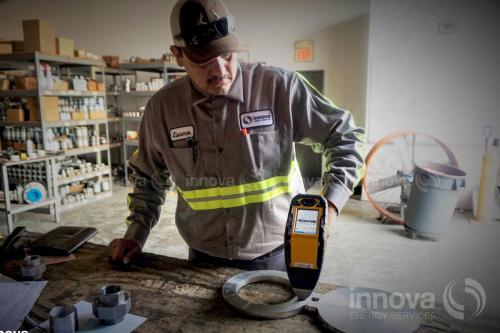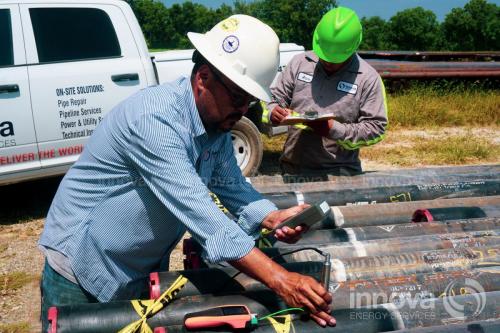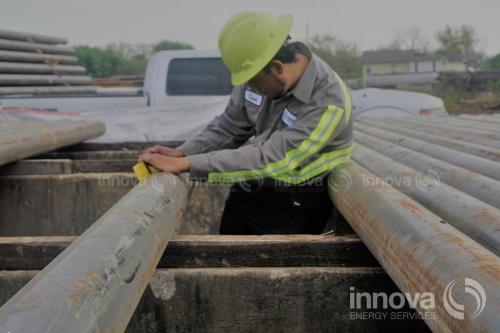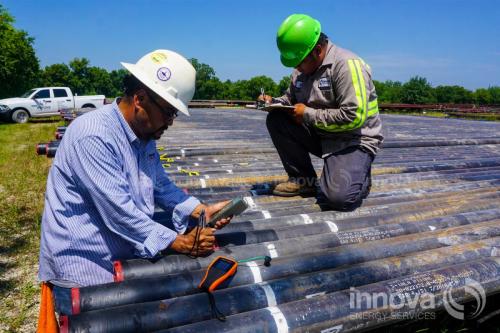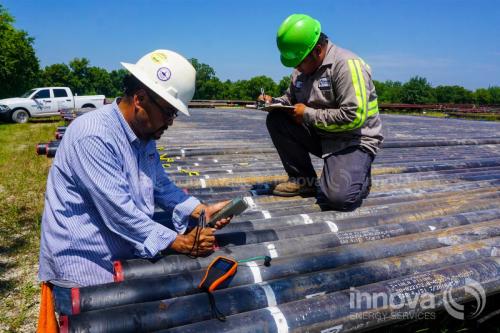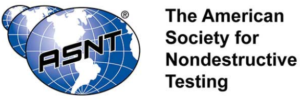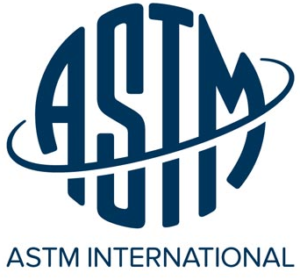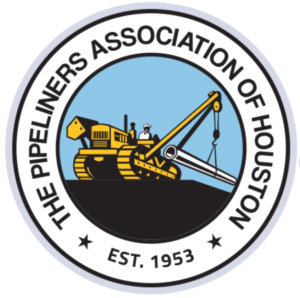We know it is critical to your business that the products you receive, install or sell are in compliance with all the technical specifications required and are not damaged. We help reduce the inherent risk associated with international trade and shipping as well as quality control for critical, high-value infrastructure projects.
Our third-party inspection, testing and verification services provide you the peace of mind, and the documentation, to confirm or contest the accuracy and condition of your product. Innova Energy Services employs highly trained and certified technical inspectors that offer a range of on-site and laboratory inspection and testing services.
On-site Inspection and Nondestructive Testing (NDT) Services
Innova has implemented quality control and quality assurance inspection plans that determine the material’s compliance to its manufacturing specifications, such as ASTM, API, ASME, ANSI, NACE, SSPC, and others.
Line Pipe and OCTG Inspection
- Visual and Dimensional Inspection (Including Diameter Measurement and out-of-Roundness Verification)
- Wall Thickness Determination Using Ultrasonic Thickness Gauges and Mechanical Calipers
- Detection of Cracks, Laminations and Inclusions Using Ultrasonic Flaw Detectors and Other NDT Methods and Techniques
- Detecting and Evaluating Manufacturing Defects and Poor Workmanship
- Coating Thickness Measurement
- Determination of Soluble Salt Contamination (Using Field and Laboratory Testing Assessment of Transit Damages)
- Handling Claims
- Residual Magnetism Testing
- Hooked Ends Inspection
- Drift Testing
- Thread Inspection
- UT Prove-Ups (Thickness and Flaw Detection)
- Special End Area Inspection (SEA)
- Magnetic Particle Testing (MT)
- Electro-Magnetic Inspection (EMI)
- Hardness Testing
- Hydrostatic Pressure Testing
Non-Destructive Testing
NDT methods and techniques consist in locating and evaluating imperfections to determine if they are considered flaws according to our customer’s required codes, standards, and specifications.
Visual Testing (VT): Used extensively to evaluate the condition or quality of the test objects being examined. Visual inspection can be enhanced by various methods ranging from low power magnifying glasses to the use of borescopes.
Ultrasonic Testing (UT): Ultrasonic testing uses high frequency, highly directional sound waves to measure material thickness, find hidden internal flaws, or analyze material properties in metals, plastics, composites, ceramics, rubber, and glass. Using frequencies beyond the limit of human hearing, ultrasonic instruments generate shorts bursts of sound energy that are coupled into the test piece, and the instrument monitors and analyzes reflected or transmitted wave patterns to generate test results.
Magnetic Particle (MP) Testing: Used for the detection of surface and near-surface flaws in ferromagnetic materials. A magnetic field is applied to the specimen, either locally or overall, using a permanent magnet, electromagnet, flexible cables or hand-held probes. If the material is sound, most of the magnetic flux is concentrated below the material’s surface. However, if a flaw is present, the flux is distorted locally and ‘leaks’ from the surface of the specimen in the region of the flaw. Fine magnetic particles, applied to the surface of the specimen, are attracted to the area of flux leakage, creating a visible indication of the flaw.
Liquid Penetrant Testing (PT): Apart from visual inspection this is probably the oldest and most widely used of all the NDT methods. It can be used on any non-porous material. It is used to reveal surface breaking flaws by bleed-out of a colored or fluorescent dye from the flaw. Test objects are coated with visible or fluorescent dye solution. Excess dye is then removed from the surface, and a developer is applied. The developer acts as blotter, drawing trapped penetrant out of imperfections open to the surface. With visible dyes, vivid color contrasts between the penetrant and developer make “bleed-out” easy to detect.
Positive Material Identification (PMI) Testing: PMI testing determines the chemical composition of metals and alloys at various stages of the manufacturing process using state-of-the-art portable equipment.
Portable Hardness Testing: We offer quick and reliable on-site hardness testing using state-of-the-art portable equipment.
Laboratory Testing
Innova partners with testing facilities that are ISO 9001:2000 certified, A2LA, and ISO 9003 accredited.
Our laboratory services include:
- Chemical Analysis
- Tensile Testing
- Charpy Testing
- Hardness Testing (Rockwell and Brinell)
- Drop Weight Tear Testing (DWTT)
- Bend Testing
- Scanning Electron Microscopy (SEM) / Energy Dispersive Spectroscopy (EDS)
- Wear Testing
- Metallography
- Heat Treatment – Material Qualification
- Weld Sample Testing
- Corrosion Testing
- Grain Size Determination
- Coating Thickness Measurement
- Determination of Soluble Salt Contamination
- Ion Chromatography
- Inductively Coupled Plasma (ICP)
- Moisture Testing and Others
Turn around for routine testing is typically within 48 hours of receipt of the sample. We can also provide 24-hour and weekend service for time-critical needs.
Operator Qualifications Verified Through:
Proud Members of:
Innova is a certified minority-owned business by the state of Texas.
“Thanks Hernan. Your team’s work ethic, efficiency, and willingness to adapt to the work at hand is impressive.
I would enjoy working with Innova again”
Mike Ruchti
EQT Corporation
Mountain Valley Project in West Virginia, USA



